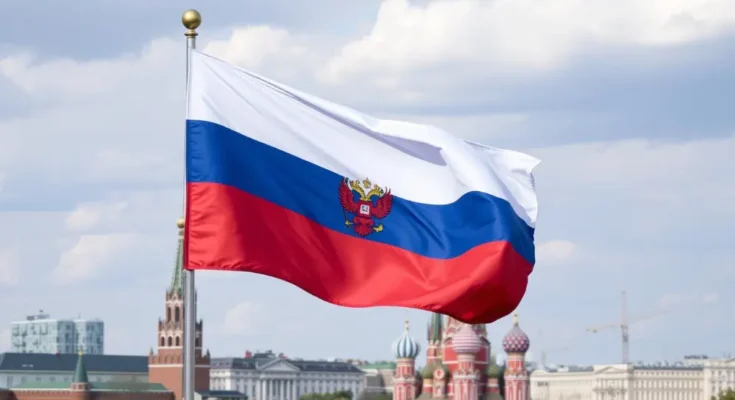Entrepreneurial Ventures in Russia: Unlock New Opportunities
Russia’s vast market is teeming with untapped potential for entrepreneurs. Its rich resources and growing economy create a unique landscape for business ventures. Entrepreneurship in Russia is on the rise, attracting both local and foreign investors eager to explore new horizons.
The Russian market entry process may seem daunting, but it’s packed with rewards for those who navigate it skillfully. From tech startups in Moscow to eco-tourism in Siberia, business opportunities in Russia span diverse sectors. The key is understanding the local culture, regulations, and market dynamics.
As you embark on your entrepreneurial journey in Russia, you’ll find a blend of challenges and exciting prospects. The country’s push for innovation and modernization creates a fertile ground for fresh ideas and bold ventures. Are you ready to unlock the potential of this dynamic market?
Key Takeaways
- Russia offers diverse business opportunities across various sectors
- Understanding local culture is crucial for successful market entry
- The country is actively promoting innovation and modernization
- Both foreign and domestic entrepreneurs can tap into Russia’s potential
- Navigating regulations is key to unlocking business success in Russia
Overview of Russia’s Business Landscape in 2024
Russia’s business scene in 2024 is a blend of hurdles and chances for entrepreneurs. Despite global turmoil, the Russian economy shows resilience. We’ll delve into the current economic state, key sectors for investment, and promising business zones.
Current Economic Climate and Market Trends
The Russian economy in 2024 sees steady growth in domestic sectors. Digital transformation and import substitution shape market trends. E-commerce is booming, while traditional sectors embrace new technologies.
Key Industry Sectors for Investment
Investment sectors in Russia offer a wide range of opportunities for entrepreneurs. The technology sector is leading the growth, followed by renewable energy and agriculture. Here’s a detailed look at the top sectors:
| Sector | Growth Rate | Investment Potential |
|---|---|---|
| Technology | 8.5% | High |
| Renewable Energy | 6.2% | Medium-High |
| Agriculture | 4.8% | Medium |
| Manufacturing | 3.9% | Medium |
Regional Business Development Zones
Russian business zones offer unique benefits for startups and established companies. These zones provide tax breaks, simplified rules, and infrastructure support. Notable zones include:
- Skolkovo Innovation Center near Moscow
- Kaliningrad Special Economic Zone
- Far East Development Corporation
Each zone focuses on specific industries, promoting growth in technology, manufacturing, and logistics across Russia.
Understanding Russian Business Culture and Etiquette
Russian business etiquette is essential for entrepreneurs aiming for success. Knowing the cultural norms in Russian business is crucial for foreign entrepreneurs. It helps them navigate the complex world of partnerships and negotiations.
In Russia, personal relationships are vital for professional success. Business meetings often begin with small talk and may include shared meals or drinks. This social aspect is crucial for building trust and rapport.
Communication styles in Russian business are direct and formal. It’s common to address people by their full name and patronymic, showing respect and professionalism. Being punctual is highly valued, so arriving on time or slightly early for meetings is essential.
“In Russia, business is personal. Take time to build relationships, and doors will open for you.”
Gift-giving is a common practice in Russian business culture. Small, thoughtful presents can help strengthen business relationships. However, avoid overly expensive gifts, as they may be seen as bribes.
Networking in Russia often happens outside the office. Business dinners, cultural events, and even trips to the banya (Russian sauna) can be opportunities to build connections and discuss business matters informally.
| Aspect | Russian Business Etiquette |
|---|---|
| Greetings | Firm handshake, direct eye contact |
| Communication | Direct, formal, use of patronymics |
| Meetings | Punctuality expected, agenda-driven |
| Negotiation | Patience required, decisions may be slow |
| Networking | Social events, business dinners important |
Understanding these cultural nuances can significantly impact your success in Russian business ventures. By respecting local customs and building strong personal relationships, foreign entrepreneurs can unlock new opportunities in this dynamic market.
Legal Framework for Starting a Business in Russia
Starting a business in Russia is a complex journey. It’s essential to grasp the Russian business registration process, tax system, and IP protection. This knowledge is key to success in the Russian market.
Business Registration Process
The Russian business registration process is detailed. First, entrepreneurs must select a business structure. Then, they need to prepare necessary documents and register with tax authorities. This usually takes 3-5 business days. Popular choices include Limited Liability Companies (OOO) and Individual Entrepreneurs (IP).
Taxation and Compliance Requirements
The Russian tax system is complex, with various taxes and special regimes. Companies must register for tax purposes and submit regular reports. Key taxes include corporate income tax, value-added tax (VAT), and social security contributions. Small businesses might benefit from simplified tax regimes, lowering their tax burden.
| Tax Type | Standard Rate | Simplified Rate |
|---|---|---|
| Corporate Income Tax | 20% | 6% or 15% |
| VAT | 20% | Exempt |
| Social Security | 30% | 20% |
Intellectual Property Protection
IP protection in Russia is critical for safeguarding innovations and brands. The country adheres to international IP conventions, offering protection for patents, trademarks, and copyrights. Registering IP rights with the Russian Federal Service for Intellectual Property (Rospatent) is crucial for enforcement. Businesses must develop a robust IP strategy to safeguard their assets in the Russian market.
“Protecting intellectual property rights is crucial for fostering innovation and attracting foreign investment in Russia’s growing economy.”
Market Entry Strategies for Foreign Entrepreneurs
Foreign entrepreneurs looking to enter the Russian market have various strategies to consider. Each method has its own benefits and challenges for investing in Russia.
Joint ventures in Russia are a common choice. They allow foreign companies to team up with local businesses, merging their skills and resources. This partnership offers a deep dive into the Russian business world and helps understand cultural differences.
On the other hand, wholly-owned subsidiaries give full control over operations but demand a big investment and a deep grasp of Russian laws. This path is best for companies with large resources and a long-term vision for the Russian market.
Forming partnerships with local distributors or agents is a low-risk way to start. It lets foreign entrepreneurs test the market without a huge initial investment.
| Entry Strategy | Advantages | Challenges |
|---|---|---|
| Joint Ventures | Local expertise, shared risk | Potential conflicts with partners |
| Wholly-owned Subsidiaries | Full control, higher profits | High initial investment, regulatory complexities |
| Partnerships | Low-risk entry, market testing | Limited control, dependency on partners |
Success in the Russian market often comes from mixing different strategies, tailored to each business’s goals and sector. Conducting thorough market research and seeking expert advice are key to navigating Russia’s complex business environment.
Entrepreneurial Ventures in Russia: Unlock New Opportunities
Russia’s entrepreneurial scene is teeming with potential across different sectors. From advanced technology to the booming e-commerce, the country is ripe for innovative business ventures.
Digital Technology and Innovation Sectors
Russian tech startups are leading in areas like artificial intelligence, blockchain, and fintech. These fields draw substantial investment and government backing, fostering a dynamic innovation environment.
E-commerce and Retail Opportunities
E-commerce in Russia is growing swiftly. With a population eager for technology and rising internet access, online shopping platforms are flourishing. Entrepreneurs can capitalize on this trend by introducing unique products or novel shopping experiences.
Manufacturing and Industrial Ventures
The Russian manufacturing sector offers promising opportunities for entrepreneurs. Spanning automotive to aerospace, there’s ample room for innovation and expansion. Specializing in advanced materials and green technologies could be particularly lucrative.
“Russia’s diverse economy offers a unique blend of opportunities for entrepreneurs willing to innovate and adapt to local market conditions.”
To thrive in these areas, entrepreneurs must grasp local market needs, navigate regulatory hurdles, and forge robust partnerships. With the correct strategy, Russia’s entrepreneurial scene can serve as a springboard for groundbreaking ventures.
Funding and Investment Options for Russian Startups
Securing funding is a crucial step for any startup. In Russia, entrepreneurs have access to diverse financing options. Let’s explore the avenues available for Russian startup funding.
Government Support Programs
The Russian government offers substantial support to foster entrepreneurship. Startups can benefit from grants, subsidies, and tax incentives. The Skolkovo Innovation Center, for instance, provides tax breaks and funding opportunities for tech startups.
Venture Capital and Angel Investors
Venture capital in Russia is growing. Firms like Target Global and RTP Global actively invest in promising startups. Angel investors also play a significant role in early-stage funding. Platforms like AngelsDeck connect entrepreneurs with potential investors.
Banking and Alternative Financing
Traditional banks offer loans to startups, but requirements can be stringent. Alternative financing methods are gaining popularity. Crowdfunding platforms like Boomstarter and peer-to-peer lending services provide new avenues for Russian startup funding.
| Funding Source | Advantages | Challenges |
|---|---|---|
| Government Programs | Non-dilutive funding, tax benefits | Competitive application process |
| Venture Capital | Large funding amounts, expertise | Equity dilution, high expectations |
| Angel Investors | Flexible terms, mentorship | Limited funding capacity |
| Bank Loans | No equity loss | Strict eligibility criteria, collateral |
| Crowdfunding | Market validation, publicity | Requires strong marketing effort |
Understanding these options can help entrepreneurs choose the best funding strategy for their Russian startup. Each source has its pros and cons, so careful consideration is key to successful financing.
Building Business Partnerships in Russia
Creating robust Russian business partnerships is essential for success in this vibrant market. Networking in Russia transcends simple business card exchanges. It involves cultivating authentic relationships that can foster successful collaborations.
To effectively network, participate in industry events and join local business groups. These settings provide chances to encounter potential partners and understand the Russian business environment. While online tools like LinkedIn are useful, direct interactions often prove more effective.
Grasping Russian business culture is vital for forging enduring partnerships. Russians prioritize personal trust and long-term connections. Engage in casual settings like business dinners or cultural events to foster these relationships.
“In Russia, business is personal. Invest time in building relationships, and you’ll reap the rewards.”
When scouting for partners, perform detailed background checks. Examine their reputation, financial health, and market standing. Craft agreements that offer mutual benefits, aiming for long-term partnerships over quick profits.
| Networking Strategy | Effectiveness | Cultural Importance |
|---|---|---|
| Industry Events | High | Very Important |
| Business Associations | Medium | Important |
| Online Platforms | Low to Medium | Less Important |
| Informal Meetings | Very High | Crucial |
Successful partnerships in Russia rely on mutual respect and understanding. Embrace the collaborative ethos of Russian business culture. This approach will unlock new opportunities and partnerships.
Risk Management and Mitigation Strategies
Entering the Russian market demands meticulous planning and strategic foresight. Entrepreneurs must anticipate challenges in the realms of politics, economics, and law. Let’s delve into essential strategies for managing these risks effectively.
Political and Economic Risk Assessment
Keeping abreast of policy shifts and economic trends is vital. Stay updated through official government channels and consult with local experts. This will provide you with crucial insights into potential impacts on your business. Develop contingency plans for different scenarios to bolster your resilience against unexpected changes.
Currency Risk Management
Currency fluctuations in Russia can drastically influence your financial performance. To mitigate these risks, consider the following strategies:
- Use forward contracts to secure exchange rates
- Hold a mix of ruble and foreign currency accounts
- Set prices in stable currencies when feasible
Legal Risk Mitigation
Legal compliance in Russia is of utmost importance. Collaborate with local legal professionals to craft comprehensive contracts and grasp Russian business laws. Stay current with regulatory updates and maintain transparent operations to sidestep legal complications.
| Risk Type | Mitigation Strategy |
|---|---|
| Political | Regular policy monitoring, local partnerships |
| Economic | Diversification, market research |
| Currency | Hedging, multi-currency accounts |
| Legal | Expert consultation, compliance audits |
By adopting these strategies, entrepreneurs can confidently navigate the complexities of the Russian market.
Digital Marketing and Business Promotion
Russian digital marketing has seen rapid growth, opening up new avenues for entrepreneurs to engage with their audience. The digital environment in Russia comes with its own set of challenges and opportunities for businesses aiming to make a mark online.
Social Media Marketing in Russia
Social media in Russia stands out from its Western counterparts. VKontakte (VK) and Odnoklassniki lead the market. These platforms provide businesses with robust tools to connect with Russian consumers. Success hinges on creating localized content and using engaging visuals.
Local SEO and Online Presence
SEO in Russia demands a customized approach. Yandex, the top search engine, employs algorithms distinct from Google’s. To enhance visibility, businesses should:
- Optimize for Yandex’s specific ranking factors
- Create high-quality, localized content in Russian
- Build a network of local backlinks
- Utilize Yandex.Webmaster tools
Building a robust online presence in Russia extends beyond search engines. Entrepreneurs should also list their businesses on popular Russian directories and review sites. This boosts credibility and expands reach.
| Platform | User Base (millions) | Key Features for Businesses |
|---|---|---|
| VKontakte | 97 | Business pages, targeted ads, community engagement |
| Odnoklassniki | 43 | Demographic targeting, video content, gamification |
| Yandex | 50 (daily) | Local SEO, Yandex.Directory, geo-targeted ads |
By adopting these digital marketing tactics, entrepreneurs can effectively engage with their Russian audience. This approach can help businesses thrive in this vibrant market.
Success Stories and Case Studies
The Russian business landscape has seen a surge in entrepreneurial success in recent years. Let’s delve into some inspiring tales of successful Russian startups and foreign businesses in Russia that have left their mark.
Ozon stands out as the “Amazon of Russia.” This e-commerce giant has transformed online shopping in the country. Starting as a small book retailer, Ozon expanded its offerings and now serves millions across Russia.
Foreign businesses in Russia have also achieved success. IKEA, the Swedish furniture retailer, tailored its business to Russian consumers. By offering affordable, stylish furniture and embracing local manufacturing, IKEA became a household name in Russia.
Entrepreneurial success in Russia isn’t just about big names. Smaller startups like Delivery Club, a food delivery service, have thrived by addressing local needs. The company’s rapid growth and eventual acquisition by Mail.Ru Group demonstrate the potential for innovative ideas in the Russian market.
“In Russia, understanding local culture and consumer behavior is key to success. We focused on building trust and offering a uniquely Russian experience,” said Pavel Durov, founder of VKontakte and Telegram.
These success stories reveal common themes: adaptability, understanding local markets, and innovative problem-solving. They inspire aspiring entrepreneurs to explore the vast opportunities in Russia’s dynamic business environment.
Conclusion
Russia’s business landscape is teeming with opportunities for the ambitious entrepreneur. The digital technology and e-commerce sectors are booming, signaling a bright future. Success in Russia’s market demands a mix of cultural savvy, legal acumen, and strategic foresight.
Understanding Russian business culture, navigating legal landscapes, and forging strong local ties are crucial. Entrepreneurs can access funding from government initiatives and venture capital. By employing digital marketing and managing risks, businesses can flourish in this dynamic environment.
The scope of Russian business opportunities is immense, spanning manufacturing, retail, and tech startups. Russia’s diverse economy invites growth. As you start your entrepreneurial journey, remember that thorough research and adaptability are key. The Russian market’s future is full of promise, awaiting visionary entrepreneurs to carve their path.



